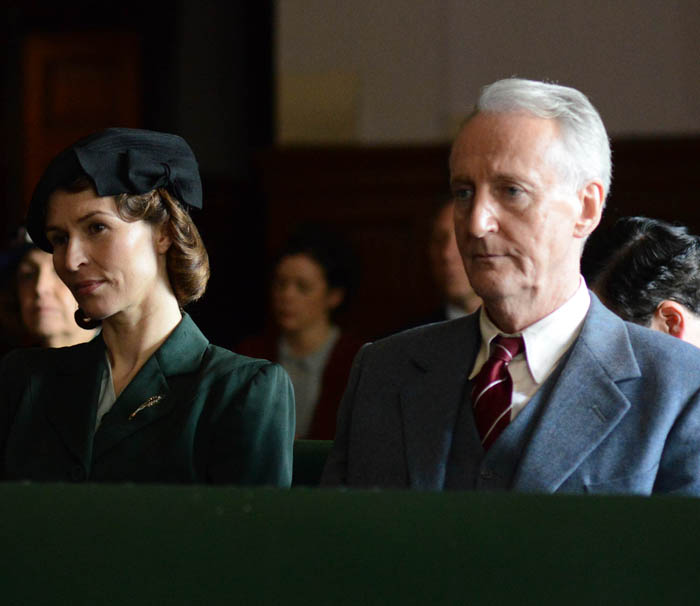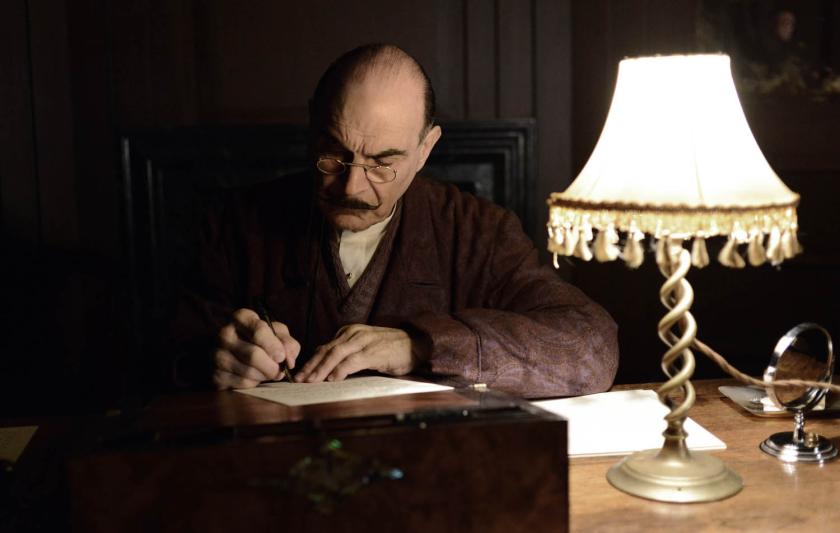Inevitably, an aura of fin-de-siècle gloom hung heavily over this final Poirot. So daunting was the prospect of terminating his 25-year career-defining stint as Belgium's finest (albeit imaginary) export that David Suchet insisted on shooting the last one before the others in the concluding series.
In many respects it was business as usual. An A-list of reliable British thesps (Anne Reid, Phil Glenister, John Standing and a deservedly-promoted Aidan McArdle) found themselves incarcerated amid the spartan, crumbling surroundings of a lonely country house. The rain beat down, and the tall trees in the grounds were lashed by gale-force winds. Deaths began to accrue.
Scenes of the ailing Poirot desperately clutching his rosary were almost indecently affecting
But if you stripped away the familiar "Major Carruthers stabbed the dowager duchess in the library" accoutrements, there was some heart-rending emotional depth within. The house in question was Styles Court, where Poirot had first met Captain Hastings 30 years earlier in 1916, when the latter was recuperating from his wounds from the Western Front. Poirot, having gambolled agelessly across the decades, was sudenly shrunken, old and ill, confined to a wheelchair and facing mortality in a cheerless nursing home.
Hastings (Hugh Fraser), appropriately back on the case for this valedictory outing, had the beaten air of an ageing widower, though Poirot did his best to be gallant. "You have worn well mon ami, with the straight back and the grey of the hair." In the background, the enigmatic Elizabeth Cole (Helen Baxendale) played with limpid mournfulness on the piano. Frankly, it was touching.
The plot, it must be said, was less than compelling, with its climactic unpicking revealing some very creaky machinery indeed. It was as if events had been allowed to unfold, and then an explanation belatedly cooked up to explain how.
But it didn't matter, because this felt uneasily like the funeral of an old friend. If you put aside the nominal story, it was some of the incidental detail that worked particularly well. The opening sequence, a montage of a courtroom verdict culminating in a discreet but powerful image of a hanging, sent grim waves of menace echoing beneath the unfolding action. Poirot's prediction of imminent murder, delivered by Suchet with baleful fatalism, draped a quasi-supernatural aura over the proceedings. I was reminded, a bit, of the Alejandro Amenábar movie The Others (Helen Baxendale and Hugh Fraser, pictured below).
 Where the story really gripped was in its evocation of a malevolent past threatening to erupt into the present, and even the routine trail of red herrings couldn't puncture the sense of onrushing doom. Scenes of the ailing Poirot desperately clutching his rosary, vowing to catch the killer only he could identify while there was still breath in his body, were almost indecently affecting.
Where the story really gripped was in its evocation of a malevolent past threatening to erupt into the present, and even the routine trail of red herrings couldn't puncture the sense of onrushing doom. Scenes of the ailing Poirot desperately clutching his rosary, vowing to catch the killer only he could identify while there was still breath in his body, were almost indecently affecting.
Poirot has often suffered from being decked out in an all-purpose period motley, so you were never quite sure whether the Nazis were just about to come to power or if Cliff Richard had just released his first single. Here, however, we were wrapped in dismal post-1945 gloom, with a sense that the tortured lives of the protagonists were inextricably linked to the bomb sites of the Blitz or the tattered battlefields of Europe.
ITV's regular re-runs of old Poirots will keep the pernickety sleuth alive indefinitely, alongside the ineffably daft Hastings and the dogged and dog-eared Inspector Japp, but the old boy's last stand raised the bar heroically. "Chapeau", as the man himself might say.















Add comment